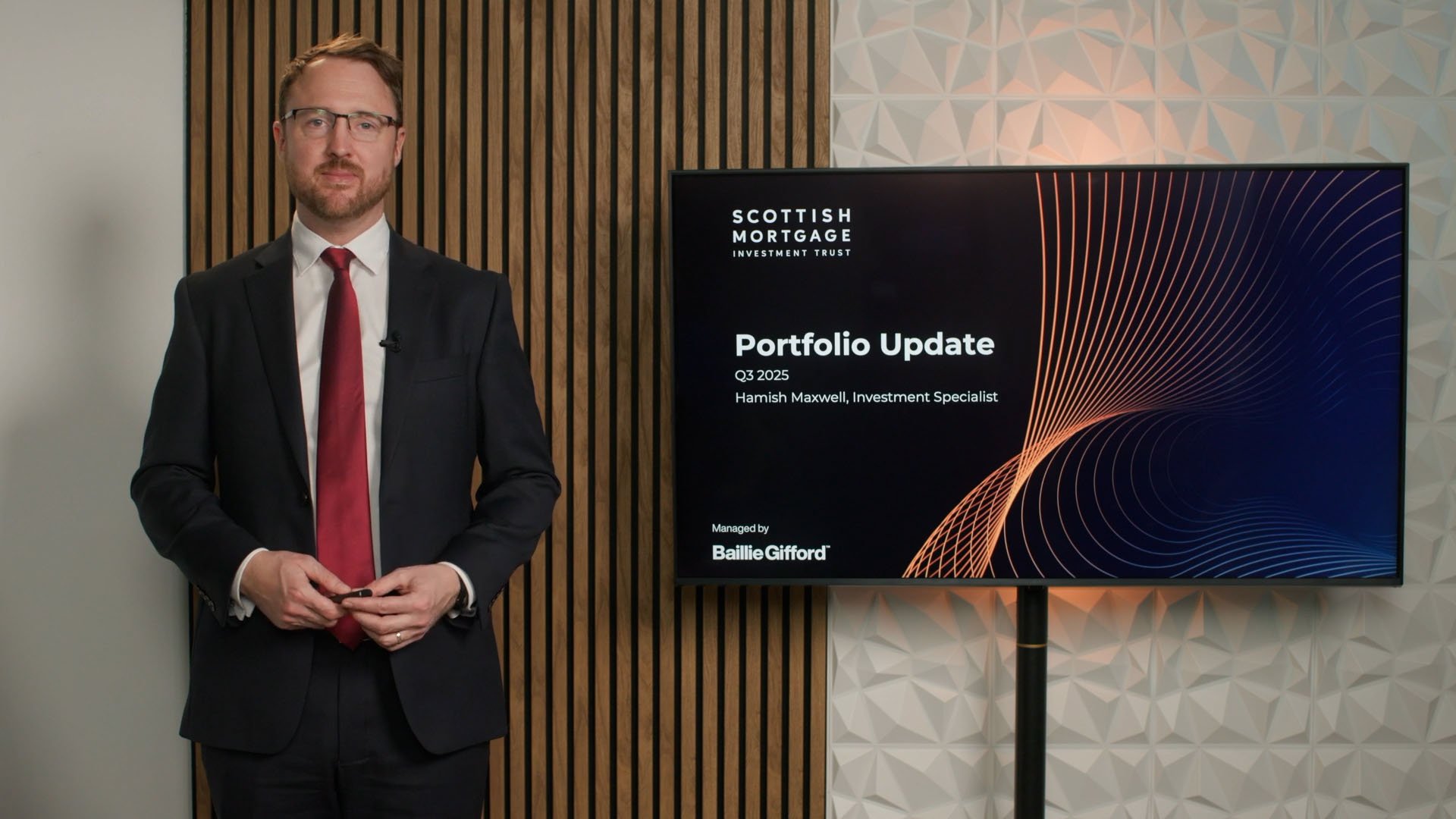Making sense of the metaverse: an interview with Matthew Ball
Claire Shaw – Portfolio Director
Key Points:
- Matthew Ball explores what is the metaverse and who’s investing in it in a book dedicated to the topic
- Games engine creators, including Epic Games and Roblox, lead the way and could reap some of its future value, he says
- But he warns that Apple and Google’s policy of taking a substantial cut of in-app sales could hamper the metaverse’s progress

As with any investment, capital is at risk.
Making sense of the metaverse calls to mind the fable of the blind men and the elephant. In the story, three sightless men feel a different part of the animal’s body and draw radically different conclusions about its appearance. Many company leaders exhibit similar behaviour in earnings calls and interviews. You sense them grasping to define the metaverse through the prism of their own activities, their only certainty being that their own business is destined to play a critical role.
Enter Matthew Ball. The venture capitalist and former Amazon executive presents a more holistic view of what he describes as the “quasi-successor” to the internet in his book The Metaverse and How It Will Revolutionize Everything. In it, he suggests that the technologies involved will “forever alter” our lives and bring about changes worth “tens of trillions of dollars”. And he identifies some of the companies best poised to capture that value – and what might stand in their way.
To start with, he provides a much-needed definition, saying the metaverse will be: “A massively scaled and interoperable network of real-time rendered 3D virtual worlds that can be experienced synchronously and persistently by an effectively unlimited number of users with an individual sense of presence, and with continuity of data, such as identity, history, entitlements, objects, communications and payments.”
That’s a lot to unpack. But the critical point, Ball explains, is that the metaverse won’t replace today’s internet but rather provide “next-generation” enhancements.
The net’s foundational communication protocols were “built for 2D information, not 3D data,” he explains, and not “real-time” interactions.
“[Today] we load a webpage, not connect to one. In addition, we experience it separately,” he adds. By contrast, the metaverse will provide a “parallel plane of existence for us all”.
It’s still hard to conceptualise what that means in practice. So, I ask for his most impressive metaverse-like experience.
“Microsoft Flight Simulator,” Ball replies. “Its map is over 500 million square kilometres, just like the real planet Earth. And it’s not static, either. [It] reproduces much of the real world’s weather, flight traffic and architectural changes over time. When you play the game using a high-end virtual reality headset, it’s impossible to come away from the experience without feeling that we are on the cusp of something transformative.”
Ball stresses that the metaverse’s potential goes far beyond gaming. But he acknowledges that video games are the biggest driver of its development, with companies including Epic Games, Roblox and the graphics chip maker NVIDIA among those leading the charge.

“They’re experts in creating virtual worlds we actually want to be in,” Ball says. “Games are the only entertainment category based on learning through failure,” he adds, suggesting their developers have “greater insight into motivational design than many social giants”.
That comment nods towards Meta, the company formerly known as Facebook. Mark Zuckerberg and his colleagues have spent more than $100bn on virtual and augmented reality projects1 to date, based on a belief that Meta will recoup the investment many times over through sales of related software and services once it catches on.
But despite the corporate rebrand, Ball makes clear that Zuckerberg faces competition – and not only from the other tech giants.
In his book, he predicts “there will be many wars in and over” the metaverse and that “insurgent start-ups” have ambitions to define its standards, provide its content and enjoy resulting revenues.
Furthermore, he quotes Epic Games CEO Tim Sweeney’s warning that “if one central company gains control of this, they will become more powerful than any government and be a god on Earth”.
So how realistic a prospect is that?
“I think Sweeney is being a little hyperbolic,” Ball replies. “[But] the metaverse is being built for, or at least around, controls and for profit. Given the significance of the internet today and the potential value of the metaverse in the decades to come, I think Sweeney’s right to be concerned.”
Epic is best known for its video game Fortnite, but it also makes Unreal Engine. The software tool allows users to build high-fidelity virtual worlds and other 3D immersive experiences without needing to know how to code.
Similarly, Roblox lets creators bring their imaginations to life in digital form. Its visuals may be less refined than Unreal’s, but it’s easier to use, which has helped attract millions of young developers and other enthusiasts to the platform.

Ball suggests these companies and others like them, including Unity Technologies, Niantic’s LightShip and NVIDIA’s Omniverse, could play foundational roles in creating the virtual future. But he warns that Apple and Google, rather than Meta, pose the greatest threat to achieving the metaverse’s full potential in the near to medium term.
Ball argues that the sizeable 30 per cent cut the two firms take from iOS and Android in-app fees will disincentivise creators from building experiences. Since those enthusiasts and professional developers will also need to pay taxes and the virtual platforms’ commission charges, he suggests the margins left will be too thin. And he reserves his harshest criticism for Apple, citing its refusal to let users install iOS apps from anywhere but its own store and noting that the firm accounts for the bulk of mobile app revenues.
“Apple uses this power to stifle competitive threats – as the most valuable non-state operated company in the world, generating more cash than any other in history, with control of the most successful product ever, it’s unlikely it wants a change to the status quo. Especially one which shifts the platform to virtual networks rather than the device.”
Epic has sued both Apple and Google, claiming their policies are anti-competitive. If those cases fail, Ball suggests regulatory intervention may be required. Of note, shortly after the interview, Bloomberg reported that Apple is considering giving users access to alternative app stores on its iPhones and iPads to avoid such a threat.
To wrap things up, I ask Ball what he thinks most investors get wrong about the metaverse.
“The metaverse is not VR [virtual reality], nor does it require it,” he replies, adding that “the appropriate timeline to observe the development of the metaverse is in decades”.
That takeaway supports Scottish Mortgage’s belief that a long-term, patient approach is required to invest in companies seeking to create the next generation of the internet. Moreover, as growth investors, our focus should be on businesses developing disruptive technologies that could underpin the metaverse’s development rather than the ‘ageing tech superheroes’ building headsets, smart glasses and other consumer-focused hardware at this early stage.
Read the complete Q&A interview with Matthew Ball
1 Virtual reality refers to an immersive environment that replaces the user’s view of their physical surroundings. This view might be computer-generated or involve 180-degree or 360-degree pre-recorded video. Augmented reality – sometimes known as ‘mixed reality’ – involves adding digital elements to the user’s view but not shutting them off from the real world.
The Metaverse: And How It Will Revolutionize Everything is published by Liveright (Hardback: £22)
About the author - Claire Shaw
Portfolio Director
Claire Shaw is a portfolio director and plays a prominent role in servicing Scottish Mortgage’s UK shareholder base. Before joining in 2019, she spent over a decade as a fund manager with a focus on managing European equity portfolios for a global client base. With a background in analysing companies and communicating investment ideas, Claire is also responsible for creating engaging content that makes the Scottish Mortgage portfolio accessible to all its shareholders. Beyond that, she works closely with the managers, meeting with portfolio companies and conducting in-depth portfolio discussions with shareholders.
Regulatory Information
This content was produced and approved at the time stated and may not have been updated subsequently. It represents views held at the time of production and may not reflect current thinking. Read our Legal and regulatory information for further details.
A Key Information Document is available by visiting our Documents page. Any images used in this content are for illustrative purposes only.
This content does not constitute, and is not subject to the protections afforded to, independent research. Baillie Gifford and its staff may have dealt in the investments concerned. The views expressed are not statements of fact and should not be considered as advice or a recommendation to buy, sell or hold a particular investment.
Baillie Gifford & Co and Baillie Gifford & Co Limited are authorised and regulated by the Financial Conduct Authority (FCA). The investment trusts managed by Baillie Gifford & Co Limited are listed on the London Stock Exchange and are not authorised or regulated by the FCA.
Baillie Gifford Asia (Hong Kong) Limited 柏基亞洲(香港)有限公司 (BGA) holds a Type 1 licence from the Securities and Futures Commission of Hong Kong to market and distribute Baillie Gifford’s range of collective investment schemes and closed-ended funds such as investment trusts to professional investors in Hong Kong.
Baillie Gifford Asia (Singapore) Private Limited (BGAS) is regulated by the Monetary Authority of Singapore as a holder of a capital markets services licence to conduct fund management activities for institutional investors and accredited investors in Singapore. BGA and BGAS are wholly owned subsidiaries of Baillie Gifford Overseas Limited, which is wholly owned by Baillie Gifford & Co.
Europe
Scottish Mortgage Investment Trust PLC (the “Company”) is an alternative investment fund for the purpose of Directive 2011/61/EU (the “AIFM Directive”). Baillie Gifford & Co Limited is the alternative investment fund manager (“AIFM”) of the Company and has been authorised for marketing to Professional Investors in this jurisdiction.
This content is made available by Baillie Gifford Investment Management (Europe) Limited (“BGE”), which has been engaged by the AIFM to carry out promotional activities relating to the Company. BGE is authorised by the Central Bank of Ireland as an AIFM under the AIFM Regulations and as a UCITS management company under the UCITS Regulation. BGE also has regulatory permissions to perform promotional, advisory and Individual Portfolio Management activities. BGE has passported its authorisations under the mechanisms set out in the AIFM Directive.
Belgium
The Company has not been and will not be registered with the Belgian Financial Services and Markets Authority (Autoriteit voor Financiële Diensten en Markten / Autorité des services et marchés financiers) (the FSMA) as a public foreign alternative collective investment scheme under Article 259 of the Belgian Law of 19 April 2014 on alternative collective investment institutions and their managers (the Law of 19 April 2014). The shares in the Company will be marketed in Belgium to professional investors within the meaning the Law of 19 April 2014 only. Any offering material relating to the offering has not been, and will not be, approved by the FSMA pursuant to the Belgian laws and regulations applicable to the public offering of securities. Accordingly, this offering as well as any documents and materials relating to the offering may not be advertised, offered or distributed in any other way, directly or indirectly, to any other person located and/or resident in Belgium other than to professional investors within the meaning the Law of 19 April 2014 and in circumstances which do not constitute an offer to the public pursuant to the Law of 19 April 2014. The shares offered by the Company shall not, whether directly or indirectly, be marketed, offered, sold, transferred or delivered in Belgium to any individual or legal entity other than to professional investors within the meaning the Law of 19 April 2014 or than to investors having a minimum investment of at least EUR 250,000 per investor.
Germany
The Trust has not offered or placed and will not offer or place or sell, directly or indirectly, units/shares to retail investors or semi-professional investors in Germany, i.e. investors which do not qualify as professional investors as defined in sec. 1 (19) no. 32 German Investment Code (Kapitalanlagegesetzbuch – KAGB) and has not distributed and will not distribute or cause to be distributed to such retail or semi-professional investor in Germany, this document or any other offering material relating to the units/shares of the Trust and that such offers, placements, sales and distributions have been and will be made in Germany only to professional investors within the meaning of sec. 1 (19) no. 32 German Investment Code (Kapitalanlagegesetzbuch – KAGB).
Luxembourg
Units/shares/interests of the Trust may only be offered or sold in the Grand Duchy of Luxembourg (Luxembourg) to professional investors within the meaning of Luxembourg act by the act of 12 July 2013 on alternative investment fund managers (the AIFM Act). This document does not constitute an offer, an invitation or a solicitation for any investment or subscription for the units/shares/interests of the Trust by retail investors in Luxembourg. Any person who is in possession of this document is hereby notified that no action has or will be taken that would allow a direct or indirect offering or placement of the units/shares/interests of the Trust to retail investors in Luxembourg.
Switzerland
The Trust has not been approved by the Swiss Financial Market Supervisory Authority (“FINMA”) for offering to non-qualified investors pursuant to Art. 120 para. 1 of the Swiss Federal Act on Collective Investment Schemes of 23 June 2006, as amended (“CISA”). Accordingly, the interests in the Trust may only be offered or advertised, and this document may only be made available, in Switzerland to qualified investors within the meaning of CISA. Investors in the Trust do not benefit from the specific investor protection provided by CISA and the supervision by the FINMA in connection with the approval for offering.
Singapore
This content has not been registered as a prospectus with the Monetary Authority of Singapore. Accordingly, this content and any other content or material in connection with the offer or sale, or invitation for subscription or purchase, of the Trust may not be circulated or distributed, nor may be offered or sold, or be made the subject of an invitation for subscription or purchase, whether directly or indirectly, to persons in Singapore other than (i) to an institutional investor (as defined in Section 4A of the Securities and Futures Act 2001, as modified or amended from time to time (SFA)) pursuant to Section 274 of the SFA, (ii) to a relevant person (as defined in Section 275(2) of the SFA) pursuant to Section 275(1), or any person pursuant to Section 275(1A), and in accordance with the conditions specified in Section 275 of the SFA, or (iii) otherwise pursuant to, and in accordance with the conditions of, any other applicable provision of the SFA.
Where the Trust is subscribed or purchased under Section 275 by a relevant person which is:
(a) a corporation (which is not an accredited investor (as defined in Section 4A of the SFA)) the sole business of which is to hold investments and the entire share capital of which is owned by one or more individuals, each of whom is an accredited investor; or
(b) a trust (where the trustee is not an accredited investor) whose sole purpose is to hold investments and each beneficiary of the trust is an individual who is an accredited investor, securities or securities-based derivatives contracts (each term as defined in Section 2(1) of the SFA) of that corporation or the beneficiaries’ rights and interest (howsoever described) in that trust shall not be transferred within six months after that corporation or that trust has acquired the securities pursuant to an offer made under Section 275 except:
(1) to an institutional investor or to a relevant person or to any person arising from an offer referred to in Section 275(1A) or Section 276(4)(c)(ii) of the SFA,
(2) where no consideration is or will be given for the transfer;
(3) where the transfer is by operation of law; or
(4) pursuant to Section 276(7) of the SFA or Regulation 37A of the Securities and Futures (Offers of Investments) (Securities and Securities-based Derivatives Contracts) Regulations 2018.







